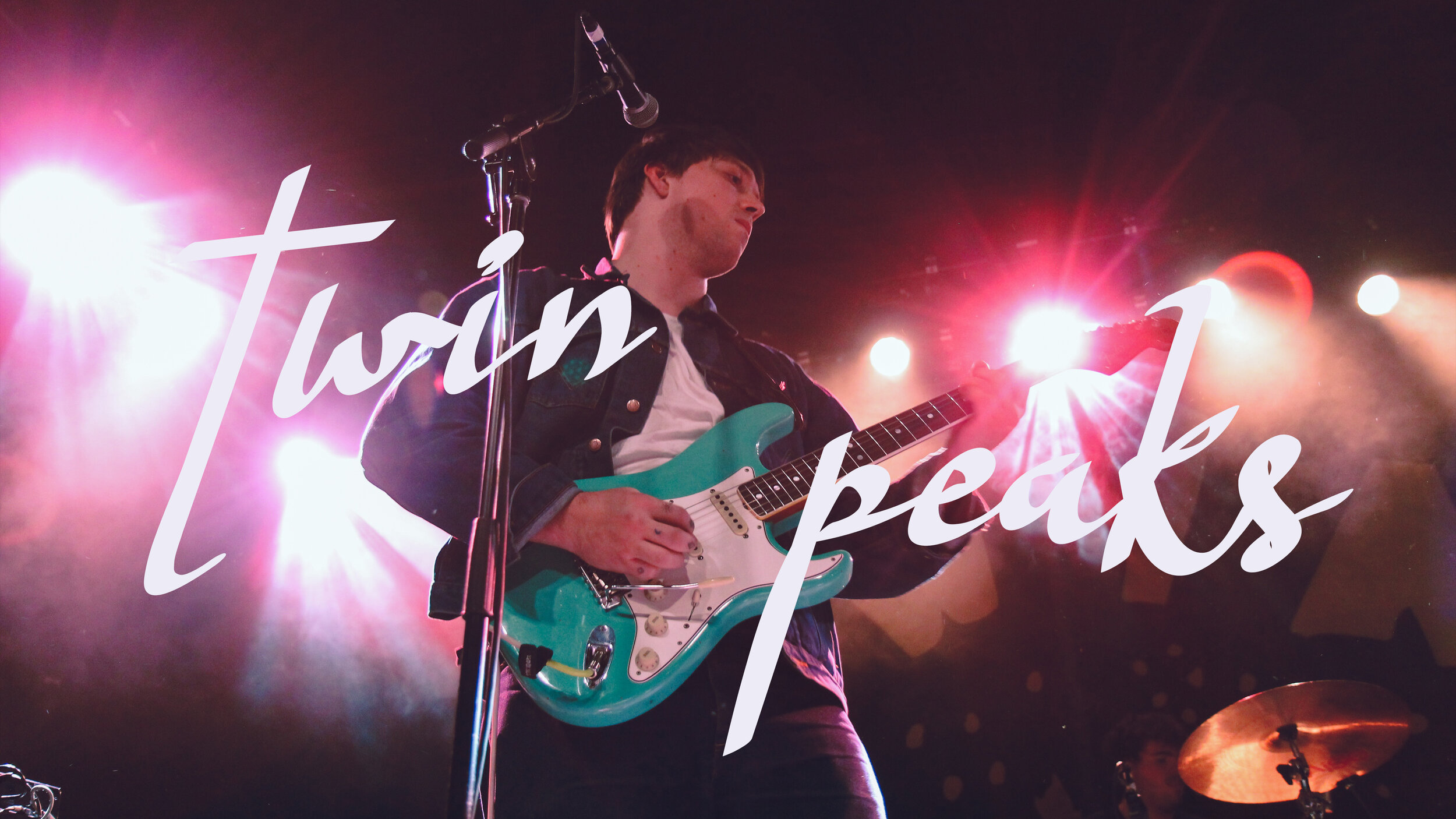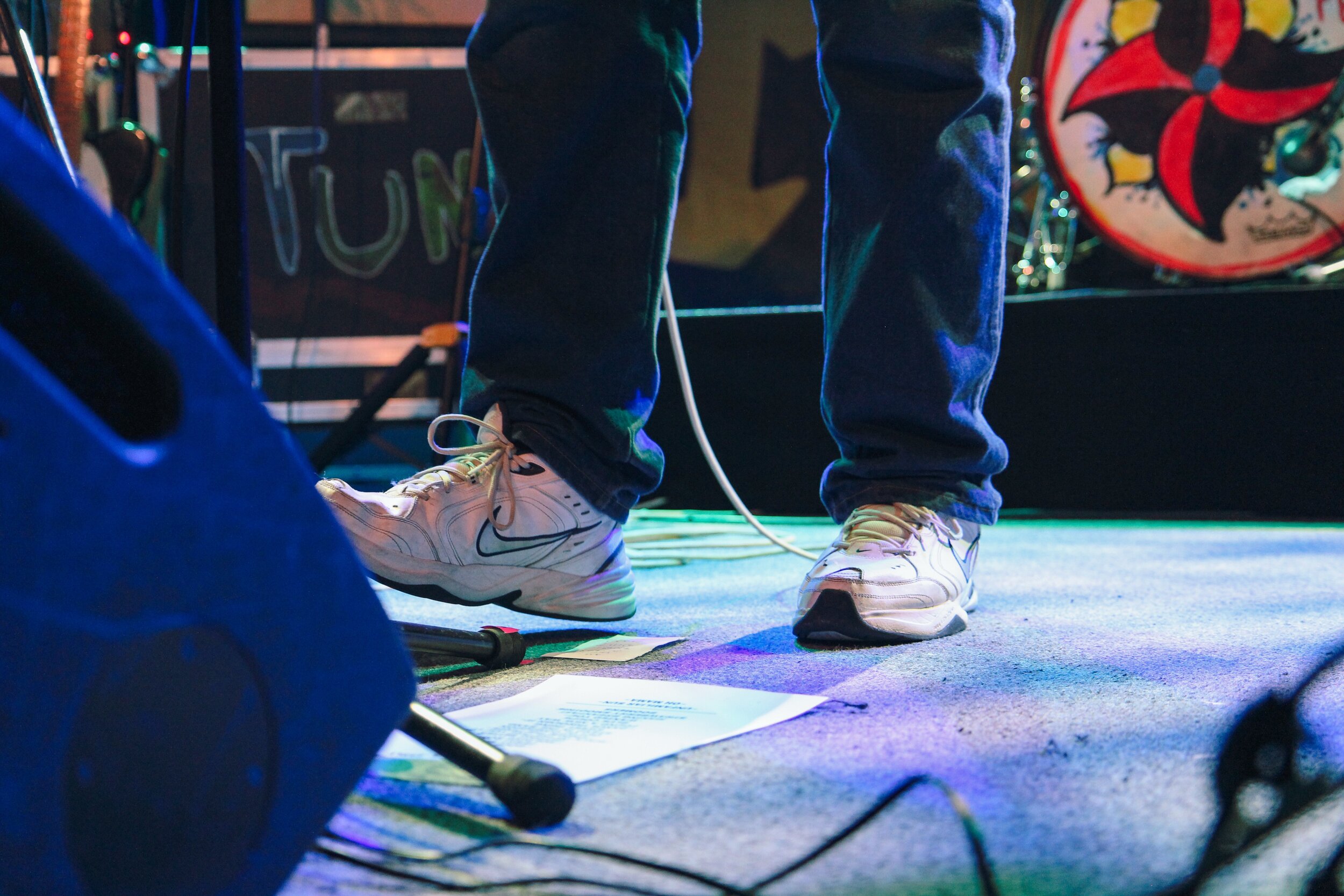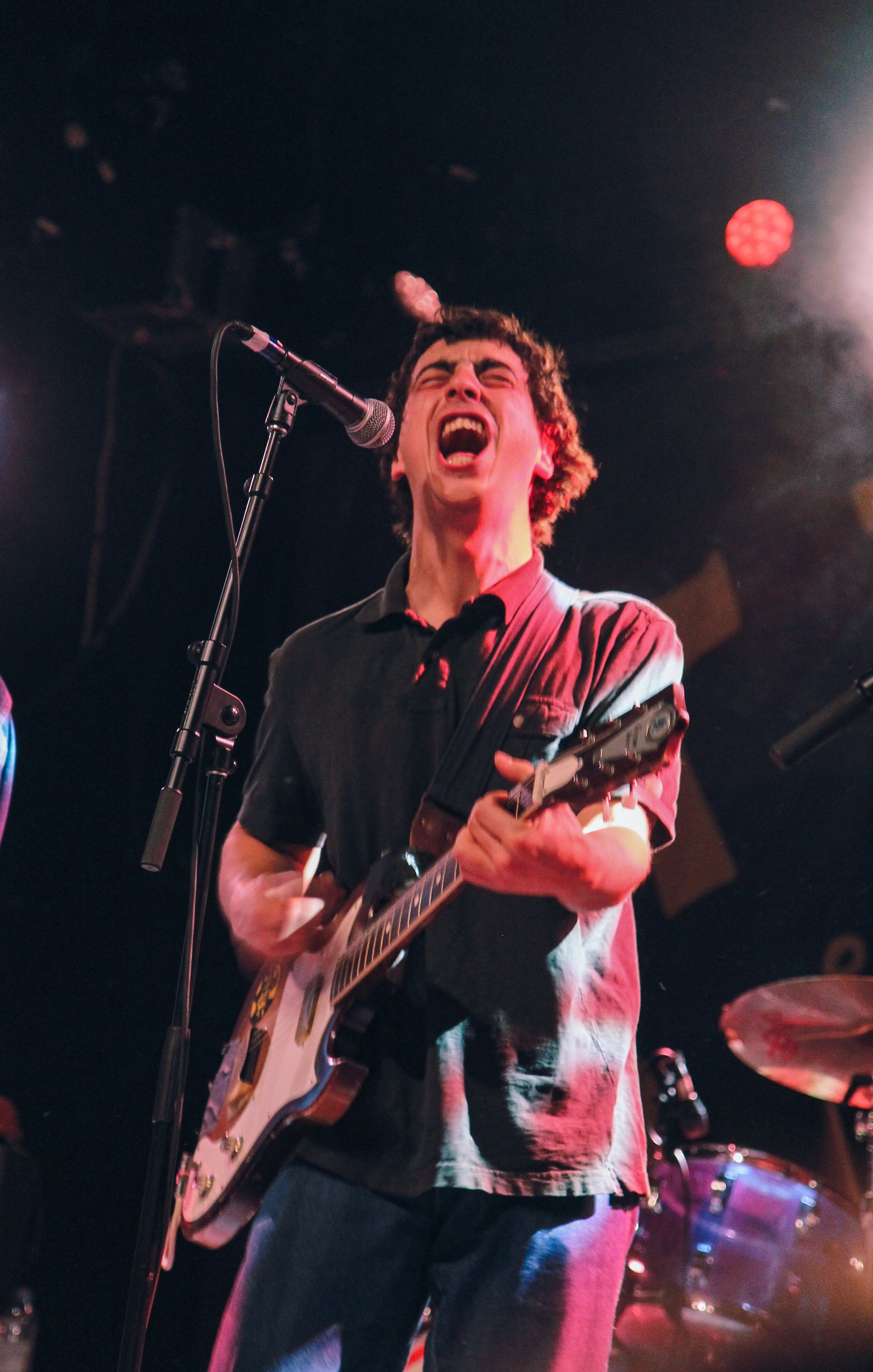Twin Peaks takes ‘Lookout Low’ to The Sinclair. Twice.
Photography by Erin Christie
by Erin Christie
In September of 2019, god-tier garage rockers Twin Peaks released their long-awaited fourth studio record. In the three-year gap between 2016’s Down in Heaven and now, fans have been foaming at the mouth for anything new from the Chicago band, something to reignite the fire that the band has consistently been able to fuel.
Lookout Low (2019) largely draws on the slower-paced, melancholic sway that the band has touched on with classic tracks like “Tossing Tears” and “Blue Coupe”—it’s honest, vulnerable, and holistically mature.
Eager to change things up with this release, each member of the band—Cadien James, Colin Croom, Clay Frankel, Jack Dolan, and Connor Brodner—took the helm on a track or two (take Croom’s “Ferry Song” and James’ “Casey’s Groove” and “Dance Through It,” for example). In effect, the record tells a variety of independent, personal stories, soundtracked by Twin Peaks’ signature charm.
Music video for Twin Peaks’ new single “Dance Through It,” from “Lookout Low,” out September 13th. Stream & Pre-Order: https://twinpeaks.lnk.to/lookout Featu…
Despite Lookout Low’s refreshing new composition, it wasn’t a total hit for those who have been looking for more of what Twin Peaks is best known for: amped up, weed-infused jams (though, the record doesn’t have a shortage of those, either—check out, “Better Than Stoned”).
Considering the anticipation leading up to its release, too, critics were amped to tear Lookout Low to shreds, and they didn’t hold back. As proclaimed by Pitchfork contributor, Abby Jones, “Chicago’s local heroes grow up a little on their fourth album and [lost] some of their live-wire charm in the process.” Lookout Low received a solid score of 5.9 on the infamous publication’s scale.
Though a lack-luster Pitchfork review might be considered a death sentence to some, Twin Peaks’ diehard fanbase has ultimately proven that regardless, they’ll enjoy just about anything their favorite five-piece puts out. In a live atmosphere, the overwhelming love and loyalty that “Peax” fans have is even more apparent.
On December 5, the quintet took to Cambridge’s The Sinclair to play a double-header: two gigs in one night with Chicago bands Ohmme and Lala Lala set to open each set respectively. Before the first show of the night, I sat down with Twin Peaks member Jack Dolan (bass) to discuss the record’s conception, the band’s holistic growth since Down in Heaven, and his track, “Unfamiliar Sun.”
To begin, if you were going to describe Twin Peaks to someone who’s never heard of you guys, what would you tell them? Which songs would you recommend them to listen to?
Ooh, that’s tough! We’re just kind of a mix of just pure rock and roll [with] a little bit of trippy elements, I guess. And if you’re just getting into us, a good place to start would be—I wanna pick something off the new record because I feel like that’s the closest to where we are now—I would say “Under a Smile” is a good middle-of-the-road; it has all of the elements for sure. I would also just say that seeing us live is a very different experience, too.
This record is a bit of a step in a different direction for you guys—which definitely isn’t a bad thing! But Pitchfork was super rough on it…
Yeah, that was funny for us too. We’ve always kind of flown under the radar with Pitchfork—pretty middle-of-the-road; like seven, average—but this was the first time that we had gotten that! We were just like, “Fuck, now what?”
They definitely went in.
Which I kind of appreciate. It would get really boring if the review was glowing. Obviously, that would rock, but it kind of gives you a little kick in the ass for the next time you do something.
Aside from Pitchfork, how would you say fans are reacting to Lookout Low? With this tour in mind, when you’re playing songs off the new record live, are people still losing their minds and throwing elbows?
I think we have this kind of “cultish” fanbase at this point. We’ve been doing this for a really long time, and for Chicago people, we’ve been playing there for almost ten years now. From that point of view, it’s like, yeah, it does feel like all the hard work [is] paying off. When you can sell out one of the bigger venues in Chicago [the band sold out The Riviera on November 29] and see people really respond to coming back home…it’s super huge for us. It’s nice to know that people can write bad reviews or not love our music as much as they used to or not like us at all but [we] still have a really dedicated fanbase.
As a fan, you have to respect that even if what your favorite artists are releasing isn’t the same thing you fell in love with, that’s not necessarily a bad thing.
And I’ve had that kind of thing before, too, where I find myself being overly critical about a band that I really like. It’s all about your perspective. We’re definitely a band that a lot of people have grown up with—you don’t want to let anyone down, but you also wanna do your own thing, and have the freedom to. That’s what it’s all about—being able to do “it” [make music] because you want to do it.
Since you guys got your start in Chicago, how do you think that affected Twin Peaks’ beginning and general growth?
Yeah, we came up over there when we were just in high school, playing house shows with bands who were much older than us. It was just a process of learning early that kind of work ethic and what it takes to—when you’re playing in a basement or a DIY house—separate yourself from everything else, so you can put on a show that people will remember after they’ve been partying and seeing a million other bands that night.
The community is a little bit infectious in the way that people help each other out and support each other, go to each other’s shows. And then, for instance, taking bands on tour—[with] both Ohmme and Lala Lala, we all knew each other before we started playing shows together. It’s really organic. We’re really lucky to have a community like Chicago, for sure.
Lookout Low’s conception story is a little different than that of Twin Peaks’ previous releases, with having gone out to Wales to record. How did that impact how everything came to be and what inspired that decision?
Yeah, we never did a record like that—with an actual producer, traveling somewhere else to record music. We did it all live [which] was also the first time we’d done that.
With this record, we really wanted to take ourselves out of our comfort zones in all sorts of ways. It’s cool to say that we did it, but in the future, I don’t know if that’s the route to go down [laughs]. But it’s really cool; it felt like a true “band experience” because we’ve always just done stuff ourselves.
Collaboratively, Twin Peaks has been described as a bit of a “brotherhood,” and especially with this record, you each had your moments to shine. When going in, did you guys have set intentions in terms of how you wanted to bounce off of each other?
We hadn’t put out a legitimate record since Down in Heaven (2016) and that was a whole different experience. This time around, we wanted to do it like we’d never done it before. As opposed to knowing what songs we were gonna record and put on it, we just banged out like thirty demos—each of us wrote a ton of songs. From there, we picked ‘em all out and then worked on them, which was also something we hadn’t done before.
Motivations, though, we wanted to make something that felt collaborative and felt concise; something that felt like a record, like it’s its own piece. A lot of our records kind of jump all over the place because we didn’t know what we were doing [laughs], and we wanted something that has a different vibe.
This record does feel like it tells a story, and a lot of the tracks are emotionally vulnerable with that in mind. With songs such as “Under a Smile” and “Unfamiliar Sun,” is there a sense of pressure in that you’re basically airing out your heart to however many people might end up listening?
I think more so when it’s an old song—when I hear an old song or lyrics of mine, I’m just like, “Oh my god, that’s so dumb” [laughs]. It just doesn’t feel as earnest as something I would sing now.
It’s almost like freeing, in a way, to be able to be honest in a song and expose yourself like that. That’s what people really want. They don’t want to hear what you think they want to hear; they want to hear what you have to say, and about you or whatever you’re singing about. So, yeah, I definitely don’t have a problem with it because I feel like I’ve always been pretty on-the-surface, honest with myself and our fans. But, yeah, singing something like that to a crowd can be, like, “Oh man, here we go!” It goes back and forth. It’s definitely easier than listening to old stuff and wondering what I was thinking [laughs]. At the time, I was probably thinking that I made some amazing shit!
But when I have stuff that’s fresh and that I’m proud of, I have no problem.
If there was a song off this record that you are most proud of, which would that be?
I would say—I mean, this is my song—but I’m really proud of, at least the way people are receiving, “Unfamiliar Sun.” People have been quite kind about that—everybody except Pitchfork! It’s kind of funny in that way, too. Like, they would pick that song to fucking trash. I shouldn’t have even fucking read it but it’s cool.
We’re really proud of the whole record. It’s the scariest part, giving it to the fans, because if they’re like “Fuck…” then you’re like “Damn, we let some people down!” But people seem to be digging it. It was the direction we were headed down anyway and I think people have started to embrace that.
Finally, with the new year in mind, do you guys have any plans in store?
We’re gonna be recording right away, after this tour—we don’t even know what that entails…I don’t even know how much I can actually talk about! We have a full European tour coming up, and just, probably more grinding and shows and stuff like that. Getting to that bread every day.
_______
Give Lookout Low a listen and keep up with Twin Peaks on their social media!





